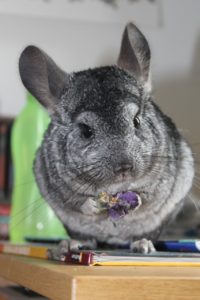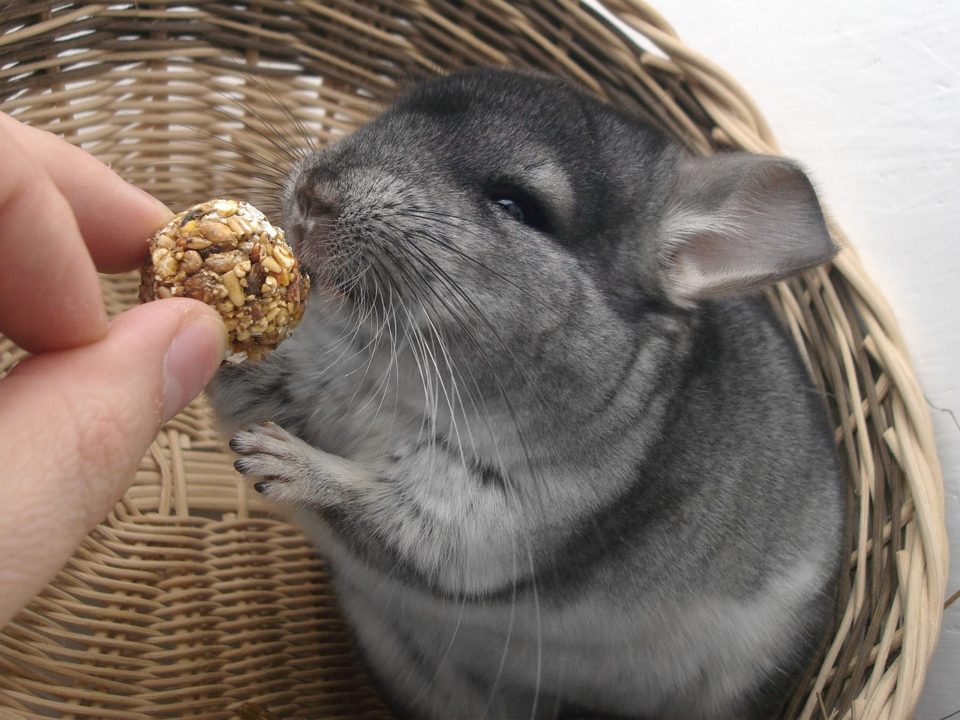Hi, my name’s Megan, and I have raised chinchillas for years.
Most of my chinchillas I have bought, but I have also raised some from birth. My chinchillas are definitely my babies, so I like to make sure they are as happy and healthy as possible.
Chinchillas are definitely one of the more uncommon pets, and – especially if it’s your first time raising them – you’ll want to do a lot of research on what supplies you’ll need to keep your furry friend as healthy and happy as possible.
While you’ll have a lot of questions going through your mind – what kind of cage to get, what kind of bedding is the best – one of your top priorities will probably be food.
Other than the regular food that your chinchilla will eat at meal times, you’ll also need to pick out some snacks.
Since chinchillas are such a rare pet, you may have trouble finding reliable information. Don’t fret, however! I’m here to guide you through the process of picking the best treats possible for your chinchilla.
How to Feed Your Chinchilla
Before you even begin to look at different snacks, it’s important that you understand how to correctly feed your chinchillas.
While it can be fun to interact with your chinchilla and give them snacks, it’s important to make sure they’re getting the nutrients they need from their food.
Luckily, a chinchilla’s diet is very simple! Like most rodents, chinchillas can get all the nutrients they need from just three things: pellets, hay, and water!

These three things are the perfect equation for a healthy, happy chinchilla who can enjoy the yummy snacks you have to reward them.
The most important thing is to buy quality pellets. Try to avoid food stuff high in fat and sugar, as this can cause illness in your pet.
My main two chinchillas – a mother and daughter duo named Lilian and Lily – were always fed natural food that lacked anything extra like fillers, vegetables, fruits, and seeds.
These ingredients can cause illnesses like diabetes and fatty liver disease. Instead, I fed them a high-quality pellet created just for chinchillas.
If after reading this you decide to switch your chinchilla’s food, make sure to do so gradually! Chinchillas have very sensitive digestive systems.
Switching the food too fast can upset their tiny tummies and cause an abundance of problems.
Like I mentioned before, the equation for a healthy chinchilla has three parts.
What type of hay you feed your chinchillas, as well as how you store it, is equally as important as the pellets. Chinchillas need hay for a lot of reasons.
It provides the nutrients they don’t get in their pellets, as well as helps them keep their dental health top notch; plus, like fiber for humans, hay helps chinchillas keep their digestive system on track.
Just because chinchillas constantly need hay available, doesn’t mean that their diet needs to be boring! I bought special wire balls and toys that held the hay to feed my chinchillas.
It allowed them to access the food they needed while providing entertainment and the opportunity to forage for food.
There is also a wide variety of options when it comes to hay. The main two types are Timothy hay and Alfalfa hay.
All mixtures of Timothy hay are good for chinchillas, while Alfalfa – which is good for growing chinchillas – should only be used as an occasional treat for adults. Explore which your options to find the best hay for your chinchillas.
As a side note, make sure to replace your chinchilla’s hay frequently! Moldy hay can cause infections in your pet.
For help in caring for your chinchilla we have created a great article on all you need for your chinchilla!
Our Best 5 Safe Treats for Chinchillas!
1. Exotic Nutrition Dried Rose Hips
After a lot of research – as well as trial and error – over the past few years, I have to say these are my favorite. To start, its main – and only – ingredient is all-natural dried rose hips.
Rose hips are a great healthy snack for chinchillas. They provided beneficial nutrients without any excess sugars or fats. Rose hips are full of important vitamins and nutrients like Vitamins C, A, and E, citric acid, and zinc.
Plus, the treat’s shape provides good exercise for your chinchillas’ jaws, as well as helps them trim their molars.
Like most rodents, chinchillas’ molars grow continuously; this means that they need to chew often to keep their teeth from becoming uncomfortable.
2. Vitakraft Chinchilla Mixed Fruit Cocktail Treat
While it is important to use these treats in moderation because of the sugar, they’re still an amazing occasional treat for your chinchillas.
These treats contain mountain ash berries, a variety of vegetables, and rose hips – an amazing herb for chinchillas.
The berries and vegetables treat your furry friend to a slight sweetness perfect for the occasional treat while not containing so much excess sugar that it is dangerous to feed your chinchilla.
Rose hips are an amazing treat and supplement for your chinchillas.
While you should never replace your pet’s foods with treats – in fact, treats should never exceed 20% of their total consumption – rose hips help your chinchilla obtain the extra micronutrients they need occasionally.
3. Exotic Nutrition Flower Assortment Treat
It is important to make sure the treats you pick out for your chinchillas are both healthy and good tasting. This treat contains rose petals, calendula, and hibiscus flowers.
Rose petals, like rose hips, offer a tasty, sweet snack for your chinchilla all while proving important vitamins and minerals.
Calendula offer both anti-inflammatory and antispasmodic benefits – improving the overall health of your chinchilla, and hibiscus flowers are a safe and tasty treat for your furry friend.
These treats provide fiber, exercise, and entertainment for your chinchilla – making them a top choice.
4. Exotic Nutrition Rose Petals and Bud Treats
I don’t think I can say it enough: rose petals, buds, and hips are probably one of the best snacks possible for chinchillas.
I know that my chinchillas absolutely love them, which is why I think that this treat is a great option.
Like other Exotic Nutrition treats, these have minimal amounts of sugar and fat, while providing the needed fiber for your chinchilla.
The ingredients are completely natural and organic, so you can spoil your furry friend without worrying about what they’re eating.
This treat is also safe for other small rodents such as rats, gerbils, and even squirrels – making this a great treat to buy if you have other pets and want to buy bag of treats.
5. Feel Good Organic Calendula Flowers
While these aren’t explicitly marketed as chinchilla treats, they can still make a tasty treat with an abundance of benefits.
Calendula flowers – which are also called Marigold – aren’t only a great treat for chinchillas, but also a great holistic medicine!
If your chinchilla is suffering from skin issues, calendula flowers are anti-inflammatory and can help the skin heal.
These treats are organic, so you don’t have to be worried about feeding your pet any nasty chemicals. They are also sold in a moisture proof package, so you don’t have to worry about mold growing and making your chinchillas sick.
What Not to Give Your Chinchilla as a Snack
Now since you know the best snacks to give your pet chinchillas, it’s important to understand what not to give your chinchillas as snacks. When it comes to foods high in sugar and fats, the occasional treat is usually okay, but, for the most part, they should be avoided. This includes foods such as:
- Corn
- Bananas
- Nuts
- Seeds
- Lettuce
- Raisins
I will say that I did include some of these foods in my chinchillas’ diets – but it was very rarely!
For my pets, usually around one or twice a month, I would give them two dried banana chips each and half of a small box of raisins to share. Moderation is the key here!
The reason that limiting these foods is important is because all fruits and vegetables contain an organic sugar compound called glucose.
Chinchillas are very sensitive to excess sugar, and over consumption can cause diabetes. Like with humans, a rare sweet snack is okay, but make sure that your chinchillas’ main meals and snacks are healthy.
Final Thoughts
 Thanks to their sensitive digestive systems and special nutritional needs, chinchillas can be a tough pet to find treats for.
Thanks to their sensitive digestive systems and special nutritional needs, chinchillas can be a tough pet to find treats for.
The most important thing to remember is that chinchillas need three things in their treats to keep them healthy and happy: low moisture, low sugar, and low fat.
When picking out treats, make sure to check the ingredients. If the first ingredients are fruits, vegetables, nuts, or seeds, you should either use the treats sparingly or avoid them completely.
The best treats have hay, rose hips, hibiscus, and other dried flowers and herbs as their first ingredients.
Hopefully, this guide has helped you picked the perfect snacks for your chinchilla. Snack time was always an incredible time of bonding and fun with my chinchillas, and I hope it will be for you too!





